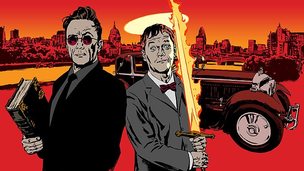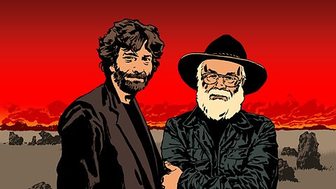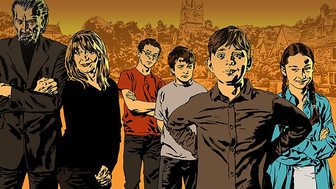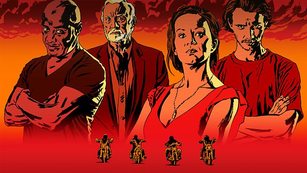
Some books almost seem doomed. Almost horrendously popular in their original form, any attempt at adapting them for film seems doomed. Case in point: Good Omens, hugely popular geek fantasy novel co-written by Terry Pratchett and Neil Gaiman. Terry Gilliam was attached to direct a film version back in 2002, but like a lot of his projects, it ended up in development hell. Then, a couple of years ago, the creation of production company Narrativia (headed by Pratchett’s daughter Rhianna) came with the announcement of a TV adaptation. Two and a half years on, and we’re still no closer to seeing the Nice and Accurate Prophecies of Agnes Nutter on screen, but this Christmas, we were treated to a three-and-a-half-hour radio production.

Obviously adapting a book to radio instead of a visual medium brings its own advantages and difficulties. For something like Good Omens, which boasts flaming swords, the Four Horsemen (Bikers) of the Apocalypse and aliens, radio is a godsend, because such things can be implied with sound effects rather than expensive special effects. But then again, anything written by Terry Pratchett has most of its humour in the narration, something lost after converting to dialogue. Luckily, in the radio production, rather than losing the comedic comments that both amuse and add to the narrative, most of these were worked into the dialogue naturally, with characters occasionally giving monologues as they spoke to themselves. These added bits very rarely felt awkward, and meant that most of the jokes didn’t get left out.

In other ways, they’ve used the radio medium to its fullest advantage, most noticeably in the part where the powers of Hell hijack Radio One and Nick Grimshaw’s voice to send a message to Crowley, and for the subtly inserted news items in the background throughout – you could easily just listen to all of those articles without paying attention to the main story to gain more background. There’s possibly only one occasion throughout the whole series where without prior knowledge, listeners might find it difficult to follow exactly what was happening, which was Hastur’s chase of Crowley along a phone line.

Given that Good Omens is such an ambitious project, the radio adaptation was brilliant. With just enough cut out that the story was still intelligible, Dirk Maggs and co retained enough of the humour and characterisation that it would make the perfect entry point for anyone who’d never read Good Omens before. For purists, maybe their favourite jokes weren’t included (poor old “Buggre Alle This” Bible), but with the extended version only weeks away, it’s difficult to see what anyone could find to complain about.
 RSS Feed
RSS Feed
